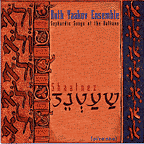Ruth Yaakov / Shaatnez

Ruth Yaakov Ensemble
Shaatnez
Piranha, CD-PR1255, 1999
In the fall of 1996 I was wandering Eastern Europe. One stop along the way was Austria where I had hoped to hear a performance of "Sephardic Songs of the Balkans." Since I was just returned from a disspirited post-Dayton Sarajevo, I eagerly took the overnight bus up to Zagreb where I caught an early morning train only to discover that the concert was rained out. As compensation, I got to hear the artist a capella, anyway, and to hear tapes, some of which may have become this album.
This is not the Sephardic balkan music of Flora Jagoda, rather it is more akin to the North African Jewish melodies with which I was familiar from years of living in Israel. Yaakov has an amazing, wonderful strong voice that captures the inflections and beauty of this Arabic-sounding music perfectly. At the same time, make no mistake about it, these are women's songs--songs about mothers-in-laws, spurned lovers, lovers who bring joy, marriage, life and hard times. Despite rabbinic disapproval that people should sing such songs, bawdy and not, this music survives because it is so grounded in life, and so sensuous. But the songs are more than that. They are also a picture of traditional sephardic culture: "now you are to meet your father in law / this is how you behave" and history, "On Shabbat, my mother" tells the story of a great fire that broke out in Thessaloniki in 1917. Many of these songs are included in the Judeo-Spanish Songbook, by Aron Saltiel and Joshua Horowitz, published by Peters Edition, Frankfurt.
Interestingly, one of the few songs that sounded like the Sephardic styles with which I am more familiar--the "El Cuando Nimrod" songs (title purposely mangled to get them all into one), is "Onde que tope una queis placiente" (Where can I find someone agreeable) which is credited as a Greek Rembetiko number. Figures. What could be more soulful or Jewish than rembetika? There are other numbers that evoke those more familiar melodies, as in "Un año hay que esto esperando." At other times, her voice is a capella, or, as in the haunting wedding song, "Ay que buena que fue la hora," accompanied only by the clapping hands of the ensemble. From the very Arabic-sounding opening song, to the soulful lament on a hot night about the passing of time, "Noche, noche" with its even more emphatic Arabic-sounding themes, there is still an incredible diversity of styles.
Yaakov's singing is only part of the story. Her voice is accompanied by incredibly-well-played instrumental music. The musicians are drawn from all over the Balkans and beyond: The ud player from Uruguay; the percussionist from Turkey; the violin player from Albania. Doli's violin on songs such as "Bre Sarica" insinuates itself into the song so seamlessly that it is heard as another voice. Yet, on the following "Chapkin te quiero", it is the dumbek and oud that open the song, and on the "violin tsittetelli," the oud and violin swap solos in a perfectly timed dance.
A lot of American bands have tried a fusion of Arabic music with a variety of classical and Jewish melodic styles. The results are often quite compelling, and I can happily enjoy bands such as Davka or Pharaoh's Daughter on their own terms. But this music, the Ruth Yaakov Ensemble, is the source. To me, these are the sounds that such groups might play if they knew the questions to ask and the melodies to learn, and the stories told by the songs, cloaked in the language of everyday life as it once was for centuries.
In summary, Yaakov has assembled an amazing group of musicians to showcase her voice, or has loaned her voice to showcase the ability of some amazing musicians--depending on where we are on the album, either description works. The result is a sensuous Arabic-Jewish sound that evokes thousands of years of Jewish culture in the world, and thousands of years of lovers meeting and loving, marrying, and living. It's a lot to pack into an album. It does make for exciting music, music that compels listening, but that also makes one impatient with listening and ready to burst, as Amichai once wrote, out into the world, again.
Reviewed by Ari Davidow 6/10/00
Personnel this recording:
Ruth Yaakov: voice
Juan Carlos Sungurlian: ud, bouzouki, saz
Levent Tarhan: percussion
Shkëlzen Doli: violin, accordion
- Alevanta Sultanachi--Get up, Sultanachi (Bulgaria) 2:44
- Salgash madre--Come out, mother (Bulgarian wedding song) 4:12
- Buenas noches Hanum Dudu--Good night Ms. Dudu (Thessaloniki. Adapted from a Greek folk song) 3:28
- Mas arriva y mas arriva--Up and up (Turkey, from repertoire of Berta Aguado) 2:15
- Bre Sarica--Hey, Sarica (Turkey) 2:53
- Chapkin te quiero--Chapkin, my love (Turkish folk song adapted to Ladino, from Jak Mayesh 78) 5:31
- Scalerica de oro--Steps of gold (Turkey) 1:58
- Onde que tope una queis placiente--Where can I find someone agreeable (Rembetiko, from Jak Mayesh 78) 2:21
- Majo, majo y majo--I grind, I grind and I grind (Turkey) 1:58
- Violin tsittetelli 4:03
- Con grande verguensa--With much modesty (Turkey) 3:56
- Ay que buena que tue la hora--Oh what a fine hour (Bulgaria) 1:41
- Un año hay que esto esperando--One year I've waited (Turkish song adapted to Ladino) 4:19
- Dia de Shabat mi madre--On Shabat, my mother (Thessaloniki) 2:18
- Mañana y mañana--Morning, in the morning (Turkey. Hispanic romance) 2:20
- Las esuegras de agora--The mothers-in-law of today (Turkey) 2:04
- Ashugar de novia galana--The dowry of the beautiful bride (Bulgarian) 0:48
- Estas mesas tan hermosas--These beautiful tables (Bulgaria) 2:52
- Ud instrumental (east Anatolia; adapted Juan Carlos Sungurlian) 3:34
- Noches, noches--Nights, nights (Sarajevo) 9:41

